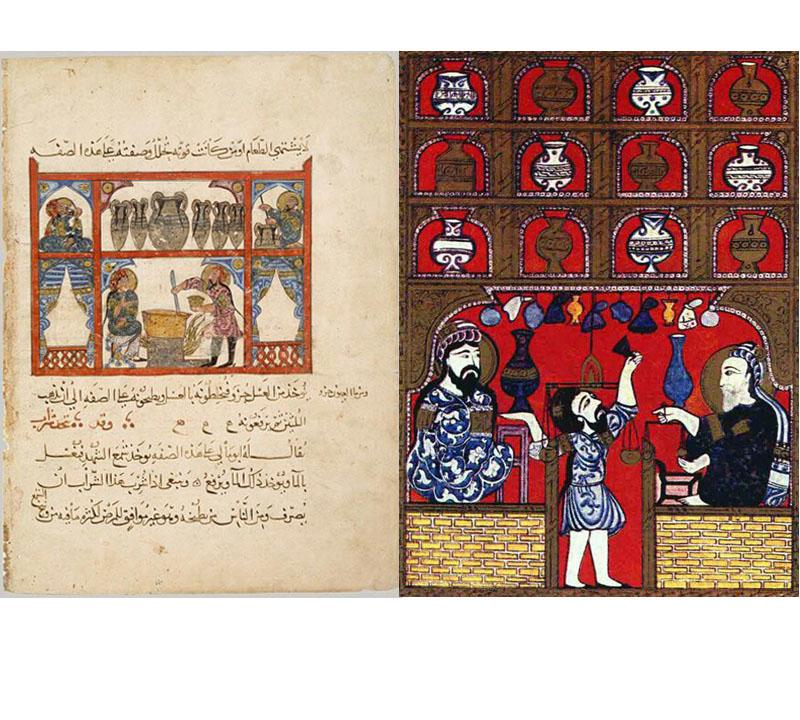
Compounding Corner - January
By Minkyung Joo, Amjed K Oudah
The Past & Present : the practice of compounding in Iraq
Iraq is a Middle Eastern country with a population of approximately 39 million people. It is located between the Tigris and Euphrates rivers, an area historically known as Mesopotamia. The first college of pharmacy was founded at the University of Baghdad in 1936. The history of modern pharmacy in Iraq began from there. The total number of registered pharmacists in the Syndicate of Iraqi Pharmacists (SIP) in 2012 is about 11,347 and 50% of them are practicing in different fields in Baghdad.
In the Middle Ages, Baghdad was a central town where compounding pharmacists contributed to the development of the pharmaceutical industry. Muslim chemists in botany and chemistry helped pharmacists to substantially develop pharmacology. The first drug store was opened by a Muslim pharmacist in 745 AD. This drug store sold ingredients and medicines to other medical practitioners, as well as compounded them for patients.
Al-Razi (864-930AD), also known as the “Galen of Persia”, was a head physician of a large hospital in Baghdad. Al-Razi used opium for anaesthesia and encouraged the use of pills over other dosage forms. He acted to promote the medical use of chemical compounds. He also described many preparations, their properties, modes of action and indications in his medical encyclopaedia.
Abu al-Qasim al-Zahrawi (Abulcasis, 936-1013 AD) was a Muslim physician and surgeon who dealt with pharmaceutical preparations for sublimation and distillation. He created recipes and explained how to compound in his medical book “Tasrif”. This allowed people to make medicines at home.
One of the greatest scholars of the medieval Islamic era was Al-Biruni (973-1048) who wrote the Pharmacopoeia of Medicine “Kitab al-saydala”. This one of the most valuable Islamic works on pharmacology and is famous for its detailed descriptions of the properties of drugs and duties of a pharmacist. The achievements of these ancient sages have became the basis for the development of the current Iraqi pharmacy profession.
Presently, Iraqi pharmacists practise in different fields including hospital, community and industry. The pharmacist’s workday in public hospitals is generally from 8:00 to 15:00. After 15:00, pharmacists may have their own private business in a community pharmacy. In hospital, clinical pharmacists provide patient-focused pharmaceutical care rather than simply dispensing medications.
Compounding is more common in community pharmacy than in hospital. Pharmacists are allowed to compound the medicine in the form of capsules, syrups, ointments and emulsions according to doctors’ prescriptions. Scarab ointment, a common treatment for scabies, has fungicidal activity and is composed of vaseline, sulfur and liquid paraben.
Most of the medicinal products used in pharmacy are produced by the Samarra Drug Industry (SDI) which is the biggest domestic pharmaceutical company founded by the government in 1957. Although personalised medications are not popular in Iraq, pharmacists are making efforts to broaden their role in compounding. They continue to develop the pharmacy education system and their profession.
References
[1] Pharmacy in Iraq: History, current status, and future directions, A.J, S.H, American journal of health-system pharmacy, 2013 Feb
[2] Iraq Pharmaceutical Country Profile, WHO
http://www.who.int/medicines/areas/coordination/Iraq_PSCPNarrativeQuestionnaire_01022012.pdf
[3] The valuable contributions of Al-Razi (Rhazes) in the history of pharmacy during the middle ages, Dr. Sharif Kaf Al-Ghazal, http://www.islamicmedicine.org/alrazi3.htm
[4] Abulcasis, the pharmacist surgeon, Fadlurrahman Manaf, Hektoen internal, January 22, 2017, http://hekint.org/2017/01/22/abulcasis-the-pharmacist-surgeon/
[5] Al-Biruni--a universal scientist, Kujundzić E, Med Arh. 1999;53(2):117-20, https://www.ncbi.nlm.nih.gov/pubmed/10386051



